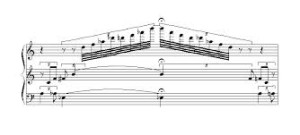Palindrome: noun, Greek origin. A word or sentence that reads the same forward as it does backward.
One of the things I’ve come to appreciate about my subscription to the San Francisco Symphony is the opportunity it provides me to sit and thoughtfully consider music I might never have chosen to listen to on my own. Case in point, a few years back, in 2010: Alban Berg’s Lulu Suite. Back in 1934, Berg had been working on his opera, Lulu, when the untimely death of Manon Gropius, daughter of Alma Mahler, prompted him to stop and write a violin concerto in her memory. Returning to his opera, he was unable to complete it before his own death in 1935, but he managed to extract excerpts to form Lulu Suite.
Atonal, or 12-tone music, is not my favorite. I tend to like the traditional fodder, the comforting hierarchy of pitches that focus on a single, central tone. It exhausts me, listening to all those notes on the chromatic scale, functioning independently of one another. It makes me think of a dozen toddlers in a too-small playroom: entertaining in small doses but ultimately disorienting.
An atonal opera, therefore, is not something that would normally have me hurrying to the ticket office. But the San Francisco Symphony programs their concerts cleverly. The lure of James Ehnes playing the Beethoven Violin Concerto in the second half was enough to fill Davies Symphony Hall that Saturday evening of the 2010 season. Further, four of the five movements of Lulu Suite are instrumental, and the story within the opera is dramatically delicious in a way only opera can be. Lulu is an ambitious femme fatale, her sexual allure the downfall of many a man even as she herself makes a determined rise up the ladder of fortune. Later, however, her fortunes reverse and from there it is a free-fall of misfortune, sending her tumbling right back down that ladder.
There exists, midway in the opera, as well as in Lulu Suite, a deciding moment. A pause. An instant of silence from the orchestra, like a drawn breath, and then we hear a trio of notes from the piano. A silent exhale, and we hear the three notes in reverse.
Lulu’s rising fortunes are all about to mutiny.
And here comes the fascinating part. The score to the second movement, the “Ostinato,” is a palindrome. From this moment on, note for note will played out in reverse, just as Lulu’s loss of fortune brings her right back to where she came from, amid the dregs of society, living as a prostitute in London’s East End. And, more fascinating, musically, it all works. Beautifully so.
This, I have since discovered, is a trademark of Berg’s work, an unwavering commitment to musicality, form and symmetry in equal parts. It astounds me that the work can be crafted in such a calculated, intellectual fashion and yet still manage to sound lyrical, passionate, deeply affecting. And to do that through a palindrome? Whoa.
In the concert’s second half, James Ehnes’s performance of the Beethoven Violin Concerto was all that I’d hoped it would be. Here there was nothing to decipher, no thinking required. I could simply sit back and allow myself to be transported by the genius and artistry of both composer and soloist. My high expectations were all met.
And yet now, even years later, darned if it isn’t scandalous, abrasive Lulu and Berg’s palindrome genius that’s got me thinking, thinking…
PS: For your brain-teasing pleasure, here are a few better-known palindromes. Feel free to contribute your own. I myself couldn’t come up with a single one.
- A man, a plan, a canal: Panama.
- Evil did I dwell; lewd I did live.
- Are we not drawn onward, we few, drawn onward to new era?
- Draw, O coward!
- Lived on decaf; faced no devil.
- Rise to vote, sir.
- Was it a car or a cat I saw?




How fascinating. This makes me think of books and movies that employ super-formal restrictions to shape content, like Christian Bok’s univocal Eunoia (http://www.chbooks.com/catalogue/eunoia) and Lars Von Trier’s Five Obstructions. But I’ve never heard of a musical work composed as a palindrome! I’d probably find atonal music really difficult to listen to — but this review’s made me curious. Time to add to my Amazon order list.
My favourite palindrome: Desserts, I stressed!
On another non-palindromic note, the word “ulul” (Lulu reversed) means “crazy” in my native Filipino.
>My favorite palindrome: Desserts, I stressed!
Loved this! And loved the rest of your comments, too, Ballettrist! I’m with you on the atonal music. Much better in a symphony hall that provides program notes. Hearing it on the radio would have done zilch for me…